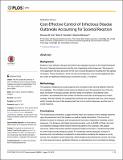Cost-Effective Control of Infectious Disease Outbreaks Accounting for Societal Reaction
Author(s)
Fast, Shannon M.; Gonzalez, Marta C.; Markuzon, Natasha
DownloadFast-2015-Cost-Effective Contr.pdf (1.311Mb)
PUBLISHER_CC
Publisher with Creative Commons License
Creative Commons Attribution
Terms of use
Metadata
Show full item recordAbstract
Background
Studies of cost-effective disease prevention have typically focused on the tradeoff between the cost of disease transmission and the cost of applying control measures. We present a novel approach that also accounts for the cost of social disruptions resulting from the spread of disease. These disruptions, which we call social response, can include heightened anxiety, strain on healthcare infrastructure, economic losses, or violence.
Methodology
The spread of disease and social response are simulated under several different intervention strategies. The modeled social response depends upon the perceived risk of the disease, the extent of disease spread, and the media involvement. Using Monte Carlo simulation, we estimate the total number of infections and total social response for each strategy. We then identify the strategy that minimizes the expected total cost of the disease, which includes the cost of the disease itself, the cost of control measures, and the cost of social response.
Conclusions
The model-based simulations suggest that the least-cost disease control strategy depends upon the perceived risk of the disease, as well as media intervention. The most cost-effective solution for diseases with low perceived risk was to implement moderate control measures. For diseases with higher perceived severity, such as SARS or Ebola, the most cost-effective strategy shifted toward intervening earlier in the outbreak, with greater resources. When intervention elicited increased media involvement, it remained important to control high severity diseases quickly. For moderate severity diseases, however, it became most cost-effective to implement no intervention and allow the disease to run its course. Our simulation results imply that, when diseases are perceived as severe, the costs of social response have a significant influence on selecting the most cost-effective strategy.
Date issued
2015-08Department
Charles Stark Draper Laboratory; Massachusetts Institute of Technology. Department of Civil and Environmental Engineering; Massachusetts Institute of Technology. Laboratory for Information and Decision SystemsJournal
PLOS ONE
Publisher
Public Library of Science
Citation
Fast, Shannon M., Marta C. Gonzalez, and Natasha Markuzon. “Cost-Effective Control of Infectious Disease Outbreaks Accounting for Societal Reaction.” Edited by Chris T. Bauch. PLOS ONE 10, no. 8 (August 19, 2015): e0136059.
Version: Final published version
ISSN
1932-6203